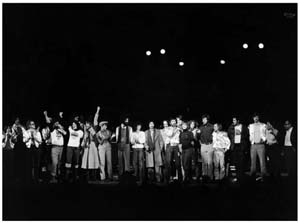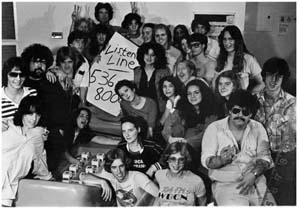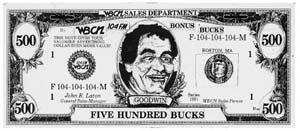Radio Free Boston (22 page)
Authors: Carter Alan


Victory onstage at the Orpheum Theater, 11 March 1979.
WBCN'S
finest hour. Photo by Eli Sherer.
The
New York Times
reported the resolution of the strike on 13 March, with Michael Knight writing, “It was a famous victory, everyone agreed, although no one could agree on exactly what had been won aside from the temporary reinstatement of 19 employees who had been abruptly dismissed when the station,
WBCN
, changed hands last month.” But much
had
been won, most notably the reality that the radio station had beaten back a hostile takeover, remapping the battlefield into a cautious cooperation between two suspicious parties. The armistice validated that a business acumen found on the corporate level should and could work together with a passion found on the street level to serve the public interest. The
Times
article went on: “Michael Harrison, the publisher of
Goodphone Weekly
, an industry newsletter, called the strike settlement a milestone for those who believe a radio station is âpart of a community and not just a collection of wires and turntables, or a business like any other.'” Looking toward a new decade, there were many great things in store for what would become known as “The Rock of Boston.” But as lofty, acclaimed, and noble as some of those future achievements would turn out to be,
WBCN
would never be as unified and purposeful as in those twenty-one days in the winter of '79. It was, and would always remain, the station's finest hour.
Fly low, beat the radar. May the wind at your back not be your own. And remember, wherever you go, there you are, so take us along.
TONY BERARDINI, RADIO SHOW CLOSER
“THE REALLLLLL
WBCN
, BOSTON!”
Michael Wiener and Gerald Carrus sat in their office on the fiftieth floor of the Prudential, looking down at the twinkling skyline of the city that had rejected them. As the two owners sat stunned in their defeat, even while publicly claiming a victory, they had to admire the fortitude of their former opponents, whom they were now inheriting, like it or not. As the two pondered their next step, the ex-strikers below headed off, arm in arm, from party to party, chattering excitedly in their groups, to continue the revelry long into (or through) the night. But Monday would soon arrive, and other than the fact that they had a job to report to, nobody knew exactly what to expect once they got there. Although the outright sacking of half the staff had been forestalled, both sides realized that a reckoning still waited. Plus, outside of
WBCN'S
bubble, the challenges that had threatened the station before the strike remained;
WCOZ
, the greatest radio threat '
BCN
would ever face, was still very much an immediate danger. And soon, that
relentless competitor would become far more dangerous as it converted, Transformer-like, into something larger and wilder: a radio beast known as “Kick-Ass Rock and Roll.”
Producer Steve Lushbaugh created a famous radio station sounder that blasted out, in Godlike magnitude, “The Reallllll
WBCN
!” across the air every hour or so. Like a marquee and spotlights proclaiming the presence of a major event inside a theater, the blaring announcement trumpeted '
BCN'S
official (and authentic) return. The employees, flushed with success, reported back to work on Monday, 12 March, finding that the environment at the station was far from unpleasant. Charles Laquidara's first poststrike “Big Mattress” became a nonstop party as listeners phoned in their good wishes, friends and supporters were thanked on the air, and Laquidara established the Hot Chocolate hit, “Every 1's a Winner,” as a victory song. “There was a harmonious reentry,” David Bieber remembered. “There was a big party at a roller rink, catered top shelf, where everybody got skates. Mike Wiener and his wife Zena were there, Gerry Carrus . . . there was really a good feeling. It was like that refreshing breeze that happens after a hurricane blows away all the bad air.”
However, although everyone smiled and acted cordially, there remained serious differences with the new owners, who still maintained that the size of the station's workforce needed to be whittled down. The
New York Times
reported, “Michael Wiener praised the settlement as a victory, although it represented a repudiation of his policies and a delay, at least temporarily, in his attempts to cut costs at the station.” Even the union's official “Strike Victory” press release, largely penned by Danny Schechter, acknowledged the latter point: “The union recognizes our need to review our staff requirements. And we are determined that any necessary staff reductions will not be effected in a capricious manner.”
“We had a strike settlement that we signed to end the walkout . . . which just meant that we went back to work under the terms of the previous contract,” Tony Berardini explained. “Then we had to sit down and work out a new contract . . . which was really something. As you can imagine, everyone was all fired up. At that first contract meeting with Phil Mamber and the new owners, about thirty peopleâjocks and sales and newsâall showed up. It turned into a three-ring circus; the new owners just got pummeled! Mike and Gerry had the most pained looks on their faces. It was brutal; [there were] several hours of recriminations and venting, and 144 all they wanted to do was move forward and get the station back on track. But it eventually smoothed out.”

The folks on the other side of 536-8000, the
WBCN
Listener Line (circa 1980). Photo by Eli Sherer.
Against the backdrop of the station's familiar voices triumphantly reas-suming their positions on the air, the inevitable trimming began. The first station casualty after the strike was Clint Gilbert, the employee responsible for staffing and running the Listener Line, who was let go by Wiener, ostensibly for his activities with the Committee for Community Access (
CCA
). As expected, John Brodey, who had been on the docket to leave even before the union action, soon put his plans in motion and exited for his job in the record industry. Jim Parry, the one
DJ
left at the station who could trace his radio genealogy back to the first nights of
WBCN'S
“American Revolution,” unexpectedly drew a pink slip. “I was not pleased with the end,” he explained sourly. “They fired a couple of people in each department: me in programming, Matty [Matthew Wong] in sales, someone in the office; it was, like, four people. But I was getting kind of [fed up] anyway, it was
really changing . . . a lot. The guys that came in knew how to run radio stations, and it became very different.” Charlie Kendall soon caught an express elevator of his own off the fiftieth floor despite working for the company and achieving a great deal of success before the strike. “When I first took the job, I said, âLook, I'll work for x amount of dollars, but you've got to give me 3 percent of the profits.'” [After the strike] Wiener and Carrus called me into the office and said, âLook, we'd like you to stay here, but no percentage points. We don't want any partners.'”
“I didn't know about that deal, but the reason Charlie had to leave anyway was that nobody could trust him,” Tony Berardini rationalized. Although the smooth-talking radio pro had helped the union during the strike, he had, after all, been Hemisphere's primary asset to keep
WBCN
on the air and functioning during the battle. “There was always going to be that division between him and everyone else. A program director needs to be a leader and you can't lead if people won't follow you.”
With Charlie Kendall out the door, Wiener and Carrus needed a replacement, so they approached Berardini. “I said no. At that time, the image of being part of management two months after the strike and aligning myself with the people who had caused it was just anathema to me. There was no friggin' way. I just wanted to be music director and do my shift.” Word about the owners' offer got around the office, though. “One day, I was in the music room; Charles and Mark came walking in. They locked the door! âTony, you
have
to take the program director job.' I said that after that long strike, I was back to doing what I liked doing. They said, âNo, you don't understand. If you don't take that job, they're going to bring in some guy from the company, some asshole from New York, who's going to want to change everything; he's going to want to tighten things up.” Berardini smiled at the memory. “What was I going to say to two on-air leaders of the radio station who were basically telling me that they'd decided that I was doing this? I told [Wiener and Carrus] that I didn't want to wear a tie and that I wanted to keep an air shift, because [typically] the
PD
at
WBCN
didn't do a regular weeknight show. Gerry Carrus looked at me like I had two heads and said, âThat's fine; you can do an air shift. And don't wear a tie; I don't care.'”
During Berardini's first week in his new office, he'd hardly figured out where to put the desk lamp before being pulled into a disagreement between Charles Laquidara and Matt Siegel about an incident on the air. “I can't remember if it was over Mishegas [a game show segment] or something,
but they were having a fight.” The quiz show segment at the end of every “Big Mattress” had grown to mammoth proportions, filling out the last fifteen minutes of Laquidara's shift and serving as the segue into Siegel, who'd inherited the midday show. “It took a good hour to deal with this since Matt had to keep running in and out of the studio because he was on the air.” While Tony concentrated on mediating the argument, a call came in from the receptionist. “She said, âThere's a guy who has an appointment waiting in the lobby. His name is Howard Stern.' I had no idea Charlie [Kendall] had made this appointment, and I certainly didn't know who the hell Howard Stern was. I said, âPlease apologize to him; tell him I'm dealing with an on-air issue and have him find a seat.' Then he waited a whole hour.” Eventually, Berardini was able to show Stern into his office. “Of course, he wasn't the big star yet; he was just looking for a gig at the station. But what was I going to do? I already had Charles Laquidara in the morning, Matt Siegel in middays, Mark Parenteau in the afternoons, and Tracy Roach at night. This was after the strike, and we had one of our best [ratings] books ever. I had no place for this guy. What was I going to give him, weekends?” Of course, Stern would eventually return as a conqueror at the head of his own massive radio empire, but regarding this initial episode with the fledgling “shock jock,” Berardini just had to smile and admit, “Who knew?”
Near the beginning of June 1979, Tony Berardini needed a part-timer to run the station from the twelve strokes of midnight to dawn on Sunday mornings, and hired his first new employee. He found me at the same place Joe Rogers, Tommy Hadges, and Oedipus had all trained:
MIT'S
WTBS-FM
(which had become
WMBR
only one week earlier). Berardini made his selection, I suppose, because I knew a bit about music and could speak fluent
AC/DC
. On the air that first night, I was speechless for six songs, but after I pulled it together, my new boss walked in and threw me the two beers left in a six pack that he and Tracy Roach had been sharing in his office while listening. I suppose it was his way of saying I passed the audition.
The radio station got back in gear as the daytime jocks resumed their shifts, and Berardini promoted Oedipus into the nightly 10:00 p.m. to 2:00 a.m. show. With the ousting of Jim Parry, Jerry Goodwin settled into the workweek overnights, unveiling a radio character who would become the offbeat nocturnal companion of many a fellow traveler on the third shift. “The âDuke of Madness' came on right after the strike,” Goodwin
explained. “I had played Fireside Theater in Detroit and they did this faux spot for âDuke of Madness Motors,' so I loved that name and thought to myself that I'd use it sometime in my life. Sure enough, the occasion came up.” But Goodwin, as the “Duke,” didn't just quietly ease onto the airwaves at 2:00 a.m.; he launched an audio assault from them. The improvised introduction to the show, woven every night from a near-cacophonous mix of music, sound effects, voices, and “drop-ins” from movies or television, could go on for as long as twenty minutes. “Wasn't that crazy? I'd make it up as I went along, and it all depended on how inspired I was.”

Jerry Goodwin, a rock and roll president? “Bonus Bucks”: a 1981 sales department credit incentive program for advertisers. Courtesy of the David Bieber Archives.
Goodwin loved the overnight hours: “There was something magical about doing a show out of that studio and being up in the fiftieth floor at night when that board would light up with all the different colored buttons on it. The lights were low, the âfatty' was burning, and you could look out past the Skywalk down South Shore to Quincy. You were the king of the world, seriously, at the top of the Hub . . . the top of the universe.” Goodwin renamed all of his nocturnal coworkers, christening a cast of characters that inhabited the dark shadows of his shift, including Listener Line volunteer Jutes Leedon, who would become his lifelong companion and future wife but was known to radio fans as the Contessa Irina DeMarco. She was joined on the line by “Judy in Disguise” and Goodwin's first producer, Richard Morris, who became Doctor Thorazine. “I had a guy answering phones that I called Captain Backwards, a funny, funny, guy who could actually speak backwards, fluently. I loved him for that. He'd talk backwards to all these people and do promos for me . . . everyone thought he was some foreigner,
for God's sake. Yeah, the overnight people were the best because they were crazier than hell . . . and that's why they were doing overnights!”
